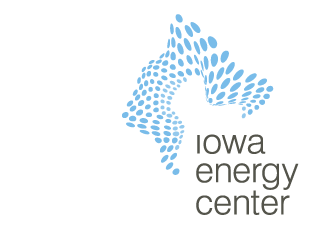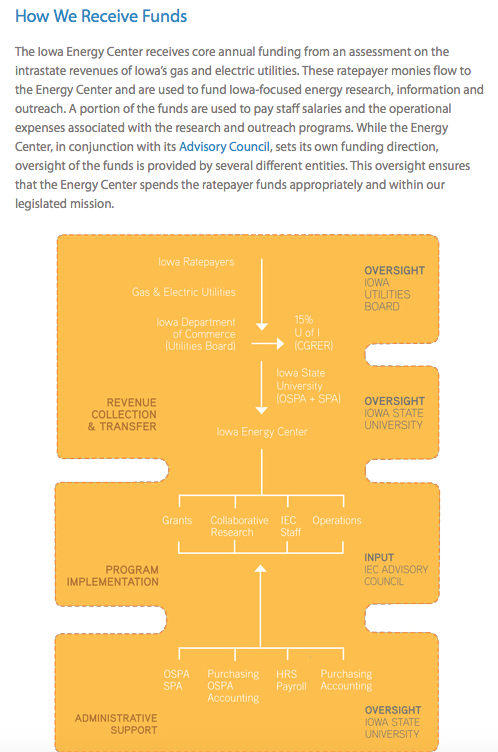In an unprecedented and “perhaps illegal” step, Iowa Utilities Board Chair Geri Huser is “withholding funding from the state’s renewable energy research center until its leaders satisfy her questions about its programs and finances,” Ryan Foley reported today for the Associated Press.
Huser’s overreach reflects a serious misunderstanding of her role as a member of the Iowa Energy Center’s advisory council. Her power play also raises questions about why Huser would go to such extraordinary lengths to disrupt activities at a center that has been promoting energy efficiency, conservation, and renewable technologies for nearly 25 years.
Huser joined the Iowa Energy Center’s advisory council shortly after beginning her term as Iowa Utilities Board chair in May. Governor Terry Branstad appointed the former state lawmaker in a move that Huser’s predecessor blasted as “an attempt to ‘bring the agency in line’ and to influence its future decision-making” to favor the investor-owned utilities the board regulates. During her time in the state legislature, Huser was among a group of business-friendly Democrats widely known as the “six-pack.”
Housed at Iowa State University in Ames, the Iowa Energy Center has a mission to support “Iowa economic growth through collaborative projects that bring smart and sustainable energy technologies closer to market and by providing Iowans with reliable, objective information on energy and efficiency options.”
In 1990, the Iowa General Assembly founded the Iowa Energy Center on the following core tenets:
• Strive to increase energy efficiency in all areas of Iowa’s energy use
• Serve as a model for state efforts to decrease dependence on imported fuels and to decrease reliance on energy production from nonrenewable, resource-depleting fuels
• Conduct and sponsor research on energy efficiency and conservation
• Conduct and sponsor research to develop alternate energy systems that are based upon renewable resources
• Assist Iowans in assessing technology related to energy efficiency and alternative energy production systems
• Support educational and demonstration programs that encourage implementation of energy efficiency and alternative energy production systems
• Develop a program to provide assistance to rural residents for energy efficiency efforts
• Cooperate with the state board of education in developing a curriculum which promotes energy efficiency and conservationThe Iowa Energy Center was created by the Iowa General Assembly and signed into law by Governor Terry Branstad in 1990. (Section 266.39C of the Iowa Code)
The advisory council primarily “assists the Iowa Energy Center in fulfilling the center’s mission by providing advice to the director regarding budgets, planning, and policies.” The relevant section of Iowa Code spells out the council’s additional role in selecting candidates to lead the center. But as you can see, nothing in state law suggests that a member of the council may withhold funding:
The advisory council shall provide the president of Iowa state
university of science and technology with a list of three candidates
from which the director shall be selected. The council shall provide
an additional list of three candidates if requested by the president.
The council shall advise the director in the development of a budget,
on the policies and procedures of the center, in the funding of
research grant proposals, and regarding program planning and review.
Returning to Foley’s report for the AP: Huser can’t even point to any red flags justifying her actions.
Huser told The Associated Press she has no indications money has been misspent. But she said she was temporarily withholding $4 million — earmarked for the center from annual assessments on electric and gas utilities — as she pushes for an audit of its grant and loan programs going back five years, and a presentation from center leaders about activities this year.
The utilities board typically transfers the money to the center by mid-September.
Huser, appointed by the governor in a shakeup of the utilities board last spring, said she has a “fiduciary responsibility” to ask questions as a member of a 13-person council that advises the center’s executive director, Mark Petri. […]
Huser acknowledged it’s unclear how long she can withhold the money and what role, if any, the utilities board plays in overseeing the center, which is operated by Iowa State University and governed by the Iowa Board of Regents.
Asked about her authority, she pointed to “a little chart (on the energy center’s website) that says the IUB provides the oversight.” That chart actually says Iowa State is responsible for oversight after the utilities board transfers funding.
Here’s that “little chart”:
Someone explain to me how a licensed attorney like Huser could interpret that chart as giving her the authority to withhold funding from the center until the director meets her demands. The Iowa Utilities Board’s oversight on the graphic refers to the board’s role in regulating gas and electric utilities on behalf of ratepayers.
I don’t know what Huser’s agenda is here, but she should not be allowed to take unilateral action that may lead to staff cuts or problems in administering energy center programs. Iowa Code authorizes the Iowa Utilities Board to appoint a representative to the Iowa Energy Center’s advisory council. It doesn’t grant that representative extra power or “fiduciary responsibility.”
UPDATE: A spokesperson for Iowa State University told Foley that the school “isn’t aware of any legal authority” for the Iowa Utilities Board to withhold funding from the energy center but will provide Huser with the information she is seeking.
A reader informed me that Huser has more oversight over the center than does the typical advisory council member, because Iowa Code 476.10A includes the following:
The Iowa energy center and the center for global and regional environmental research shall each provide a written annual report to the utilities board that describes each center’s activities and the results that each center has accomplished. Each report shall include an explanation of initiatives and projects of importance to the state of Iowa.
I don’t see anything in that text to suggest that the Iowa Utilities Board can refuse to transfer funding if members are dissatisfied with the reporting from the Iowa Energy Center or the Center for Global and Regional Environmental Research, which is housed at the University of Iowa.
If Huser is not happy with the level of detail in financial reports the board has received from the energy center’s director, she could address that problem in more constructive ways.
SECOND UPDATE: Following up on this story, Foley reported for the Associated Press on November 17 that the Iowa Utilities Board is also holding back “$772,000 earmarked for the Center for Global and Regional Environmental Research at the University of Iowa, which awards grants to researchers studying global warming’s local and regional impact.” The state legislature established the Center for Global and Regional Environmental Research and the Iowa Energy Center at the same time. The Iowa Utilities Board does not oversee the CGRER’s operations, but it does have a representative on the center’s advisory council (currently board member Nick Wagner). Another member of that council is former State Representative David Osterberg, who told Foley,
“We never intended for IUB to do anything more than pass the money on. I think she’s way out of line,” said David Osterberg, who helped write the law creating the centers in 1990 as a Democratic lawmaker. “Why is she doing this and who is she doing this for? She’s brand new on the IUB. This has to be very political.”
Great question. Later in the AP story, a representative of major investor-owned utility MidAmerican Energy defended Huser’s actions, saying, “All she’s trying to do is make sure the money collected for the Iowa Energy Center is spent in a responsible way.”
Osterberg told Foley that holding back funding for the centers is “not misreading the law. It’s just not reading the law.” Let’s read the relevant portion of that law.
476.10A Funding for Iowa energy center and center for global and regional environmental research.
1. a. The board shall direct all gas and electric utilities to remit to the treasurer of state one-tenth of one percent of the total gross operating revenues during the last calendar year derived from their intrastate public utility operations. The board shall by rule provide a schedule for remittances.
b. The amounts collected pursuant to this section shall be in addition to the amounts permitted to be assessed pursuant to section 476.10. The board shall allow inclusion of these amounts in the budgets approved by the board pursuant to section 476.6, subsection 15, paragraph “e”.
c. (1) Eighty-five percent of the remittances collected pursuant to this section is appropriated to the Iowa energy center created in section 266.39C.
(2) Fifteen percent of the remittances collected pursuant to this section is appropriated to the center for global and regional environmental research established by the state board of regents.
2. Notwithstanding section 8.33, any unexpended moneys remitted to the treasurer of state under this section shall be retained for the purposes designated. Notwithstanding section 12C.7, subsection 2, interest or earnings on investments or time deposits of the moneys remitted under this section shall be retained and used for the purposes designated, pursuant to section 476.46.
3. The Iowa energy center and the center for global and regional environmental research shall each provide a written annual report to the utilities board that describes each center’s activities and the results that each center has accomplished. Each report shall include an explanation of initiatives and projects of importance to the state of Iowa.
Nothing in the text grants the IUB power to hang on to the remittances until board members feel like releasing the funds. But the board is asserting its authority anyway:
Utilities board spokesman Don Tormey noted that the law doesn’t specify a timeline for the board to transfer the funds. He said the “board understands both organizations have reserve funds” and is seeking to better inform the public and ratepayers about their programs.
“The board will disburse the funds when they are satisfied (the centers) have answered all the board’s questions,” Tormey said.
Sad to say, it appears Huser will get away with her strong-arm tactics. Representatives from both centers will present the information to the Iowa Utilities Board on the timetable Huser requested, even though Iowa State spokesperson John McCarroll told Foley he “isn’t aware of any statute or administrative rule” allowing the board to hold back funds.
I’m tempted to call this episode the low point in Huser’s political career, but it was even worse when she joined Iowa House Republicans to try to force a vote on a constitutional amendment that would have banned same-sex marriage, less than a week after the Iowa Supreme Court’s Varnum v Brien ruling.
THIRD UPDATE: Speaking to Foley on November 18,
Gov. Terry Branstad’s spokesman is refusing to say whether he supports his appointees’ decision to withhold funding earmarked for two energy research centers. […]
Branstad appointed Huser last spring. Branstad spokesman Ben Hammes said the board is an independent agency that Branstad “doesn’t micromanage.”
Who needs to micromanage when you can use your appointment power to get rid of Iowa Utilities Board members who displease powerful interest groups?


